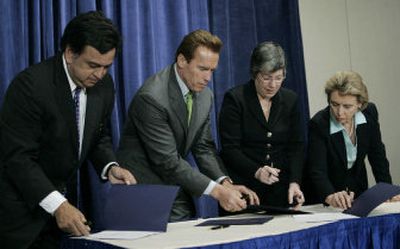Western states join to fight warming

WASHINGTON – Fed up with federal inaction and convinced of the dangers from global warming, five governors from Western states agreed Monday to work together to reduce greenhouse gases.
Their promise to target global warming was the latest of a rush of new ideas shared this week as states push ahead on climate change and clean or alternative energy.
“Thankfully the country has reached a tipping point on this issue. I wish we had done it 20 years ago,” said Minnesota Gov. Tim Pawlenty, a Republican who last week signed into law a requirement that utilities generate a quarter of their power from renewable sources such as wind, water and the sun by 2025. “Governors, members of Congress and others are now scrambling to be bold.”
The twin challenges of global warming and energy were some of the dominant points of discussion over four days at the annual winter meeting of the National Governors Association.
Out West, increasingly common droughts and bad fire seasons added urgency. The governors of Arizona, California, New Mexico, Oregon and Washington agreed to develop a regional target to lower greenhouse gases and create a market-based program aimed at helping businesses reach the still-undecided goals.
New Mexico Gov. Bill Richardson, a Democrat seeking his party’s presidential nomination, said the five-state agreement should spur other states ahead. “You’re going to see a domino effect with more and more states taking action,” he said.
On everyone’s lips was Sunday night’s Oscar for former Vice President Al Gore’s “An Inconvenient Truth” – a documentary that illustrated the changes to the nation’s climate and the dangers that lie ahead.
“We must encourage all the governors to sign onto these partnerships,” said California GOP Gov. Arnold Schwarzenegger, who has pursued some of the most aggressive efforts in the country. “I just want to make sure that everyone works together and fights global warming.”
Schwarzenegger said a cap-and-trade program, which lets companies that can’t meet their emission reduction targets buy credits from those that reduce carbon dioxide, would provide “a powerful framework for developing a national cap-and-trade program. … This agreement shows the power of states to lead our nation addressing climate change.”
Such a market pact is close to becoming reality among a number of Northeastern and Mid-Atlantic states, which plan to impose caps on power plant emissions and encourage trading of allowances among utilities.
The latest agreement – called the Western Regional Climate Action Initiative – builds on earlier efforts.
Last year, Schwarzenegger signed California legislation imposing a first-in-the-nation emissions cap on utilities, refineries and manufacturing plants, with a goal of cutting greenhouse gases to 1990 levels by 2020. And Schwarzenegger and British Prime Minister Tony Blair announced plans to work toward a possible joint emissions-trading market.
New Mexico and Arizona last year agreed to measure and report greenhouse gas emissions. A similar joint effort on climate change was agreed upon in 2003 by California, Oregon and Washington.
Carbon dioxide from burning coal, oil and other fossil fuels is the biggest of the greenhouse gases, because they create a heat-trapping blanket when released into the atmosphere. Others are methane, nitrous oxide and synthetic gases. Scientists say the atmosphere holds more carbon dioxide now than it has for hundreds of thousands of years.